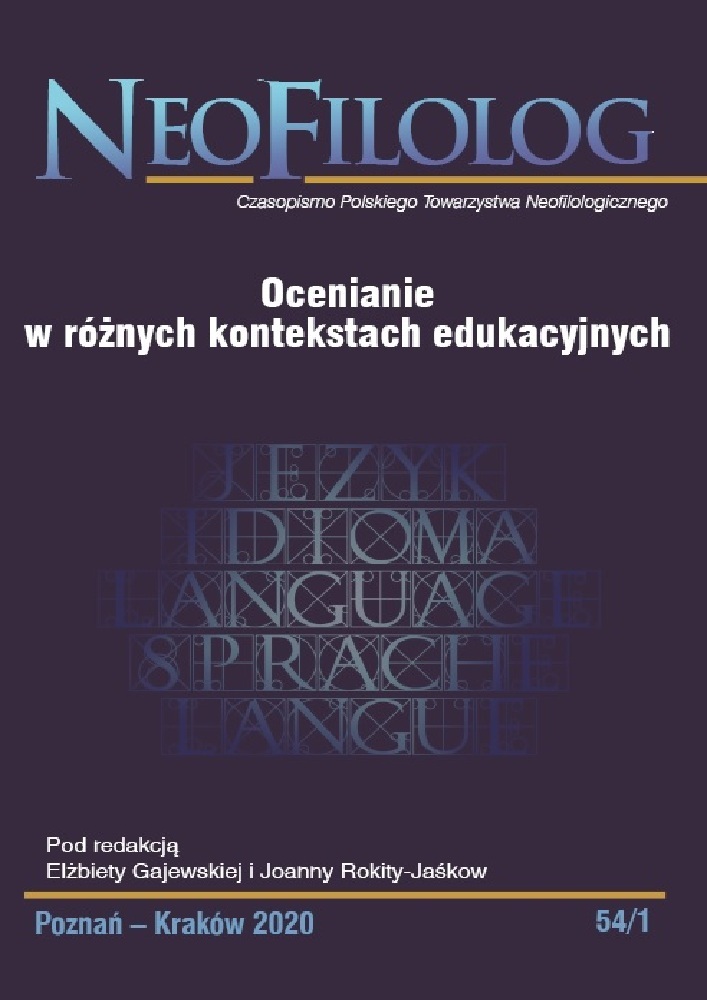Abstrakt
Open forms of work are now successfully used both in foreign language lessons and in academic education. Often, it may be difficult to assess the work of learners due to its specificity – that is, the summing and shaping of the assessment of the achievement of teaching objectives in school education and the effects of education in the didactics of the university. The question arises how to assess the work of learners during free work, while learners are working to attainment targets, working to weekly plans or doing project work. These issues will be subjected to theoretical analysis and discussed on the basis of my own empirical research in two areas of language teacher/foreign language education. On this basis conclusions will be formulated and research perspectives will be outlined with relation to school education and the academic education of foreign language teachers.
Bibliografia
Bauer R. (1998), Lernen an Stationen. Neue Möglichkeiten schülerbezogenen und handlungsorientierten Lernens. „Pädagogik“, nr 7–8, s. 25–27.
Bauer R. (2004), Offene Arbeitsformen. Nur schüleraktivierend, wenn schülergerecht. Beispiele aus der Praxis. „Pädagogik“, nr 1, s. 16–20.
Bohl T. (2004a), Prüfen und Bewerten im Offenen Unterricht. Weinheim-Basel: Beltz Verlag.
Bohl T. (2004b), Prüfen und Bewerten im offenen Unterricht. Bestandsaufnahme, Rahmenkonzeption und praktische Hinweise. „Pädagogik“, nr 12, s. 10–13.
Bohl T. (2009), Prüfen und Bewerten im Offenen Unterricht. 4. Auflage. Weinheim-Basel: Beltz Verlag.
Caspari D., Klippel F., Legutke M. K., Schramm K. (2016), Forschungsmethoden in der Fremdsprachendidaktik. Ein Handbuch. Tübingen: Narr Francke Attempto Verlag.
Epstein P. (2014), Z notatek obserwatora. Montessori w praktyce. Kraków: Oficyna Wydawnicza Impuls.
Grotjahn R. (1995), Empirische Forschungsmethoden: Überblick, (w:) Bausch K.-R. (red.), Handbuch Fremdsprachenunterricht. Tübingen und Basel: Francke Verlag, s. 457–461.
Grotjahn R., Kleppin, K. (2017), Prüfen, Testen, evaluieren. Fort- und Weiterbildungsreihe des Goethe-Instituts. München: Langenscheidt/Goethe Institut.
Hallet W., Königs F. G. (2010), Handbuch Fremdsprachendidaktik. Seelze-Velber: Kallmeyer in Verbindung mit Klett Friedrich Verlag.
Karpeta-Peć B. (2008), Otwarty, aktywny, samodzielny … Alternatywne formy pracy. Przewodnik dla nauczycieli języków obcych. Warszawa: Fraszka Edukacyjna.
Karpeta-Peć (2017), Indywidualizacja nauczania i uczenia się – otwarte formy pracy w gimnazjum oraz w kształceniu akademickim (action research), (w:) Werbińska D., Biedroń A. (red.), Różnice indywidualne w uczeniu się i nauczaniu języków obcych: konteksty edukacyjne, „Neofilolog”, nr 49/1, s. 95–114.
Kerschhofer-Puhalo N. (2001), Pädagogisch-didaktische Lernkategorien II: Organisationsformen von Lernen, (w:) Helbig G., Götze L., Henrici G., Krumm H. J. (red.), Deutsch als Fremdsprache. Ein internationales Handbuch. Berlin-New York: Walter de Gruyer, s. 761–776.
Kunter M., Trautwein U. (2018), Psychologie des Unterrichts. Padeborn: Verlag Ferdinand Schöningh.
Lehner M. (2009), Allgemeine Didaktik. Bern-Stuttgart-Wien: Haupt Verlag.
Łobocki M. (2000), Metody i techniki badań pedagogicznych. Kraków: Oficyna Wydawnicza Impuls.
Montessori M. (1949/1994), The absorbent mind. Oxford: Clio Press.
Niemierko B. (2002), Ocenianie szkolne bez tajemnic. Warszawa: Wydawnictwa Szkolne i Pedagogiczne.
Peschel F. (2010), Offener Unterricht. Idee, Realität, Perspektive und ein praxiserprobtes Konzept in der Evaluation. Teil I. Baltmannsweiler: Schneider Verlag Hohengehren.
Riemer C., Settinieri J. (2010), Empirische Forschungsmethoden in der Zweit- und Fremdsprachenerwerbsforschung, (w:) Krumm H.-J., Fandrych C., Hufeisen B., Riemer C. (red.), Deutsch als Fremd- und Zweitsprache. Ein internationales Handbuch. Handbücher zur Sprach- und Kommunikationswissenschaft. Berlin-New York: De Gruyter Verlag, s. 764–781.
Sehrbrock P. (1993), Freiarbeit in der Sekundarstufe I. Frankfurt/M: Cornelsen Scriptor.
Schart M., Legutke M. (2018), Lehrkompetenz und Unterrichtsgestaltung. München: Goethe Institut.
Stein B. (2003), Teoria i praktyka pedagogiki Marii Montessori w szkole podstawowej. Kielce: Jedność.
Vollmer H. J. (1995), Leistungsmessung: Überblick, (w:) Bausch K.-R., Christ H./ Krumm H.- J. (red.), Handbuch Fremdsprachenunterricht. Tübingen/Basel: Francke Verlag. s. 240-249.
Wilczyńska W., Michońska-Stadnik A. (2010), Metodologia badań w glottodydaktyce. Wprowadzenie. Kraków: Wydawnictwo Avalon.
Licencja
Prawa autorskie (c) 2020 Beata Peć

Utwór dostępny jest na licencji Creative Commons Uznanie autorstwa – Bez utworów zależnych 4.0 Międzynarodowe.
Przedstawiany utwór (artykuł) upubliczniany jest na podstawie umowy z autorem i na licencji Creative Commons Attribution-NoDerivatives 4.0 International (CC BY-ND 4.0).
Użytkownicy mają obowiązek podania wraz z rozpowszechnionym utworem, informacji o autorstwie, tytule, źródle (odnośniki do oryginalnego utworu, DOI) oraz samej licencji;
- bez tworzenia utworów zależnych,
- utwór musi być zachowany w oryginalnej postaci.
Uniwersytet im. Adama Mickiewicza w Poznaniu zachowuje prawo do czasopisma jako całości (układ, forma graficzna, tytuł, projekt okładki, logo itp.).

